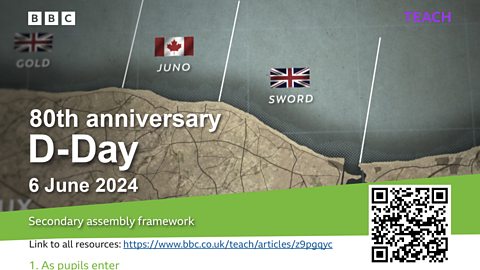Aim
To commemorate the 80th anniversary of Victory in Europe Day (VE Day) on 8 May 2025 and to consider what life was like in the UK in the years immediately after World War Two.
The video
Historian Shalina Patel meets social media stars Jess and Norma to discuss VE Day
SHALINA:
On Tuesday the 8th of May, 1945, people in the UK celebrated Victory in Europe Day or VE day after the surrender of Nazi Germany. Prime Minister Winston Churchill announced the news to the nation over the radio, and huge crowds gathered quickly in the streets to celebrate the end of the war. There was an overwhelming sense of relief, jubilation, and excitement.
But what was the reality of postwar Britain once the party was over?
SHALINA:
So, Norma, you were 11 years old when the war ended. So can you tell us what you remember about VE day?
NORMA:
Parties, the joyous mood and everybody dancing and hugging each other and I can't explain the atmosphere that I still feel for people at that time in their lives.
JESS:
Did things go back to normal straight after the war?
NORMA:
Oh no. No, it couldn't go back to normal, Jessica. I had to wait a while to get a banana.
NORMA:
It was a horrible time all told, for everybody, especially with rationing.
SHALINA:
What can you remember about shopping during rationing?
NORMA:
My mum used to go and join a queue to see if she could come away with something. Everything was based on what your ration book could give you.
SHALINA:
Are there any particular meals that you remember having during those years of rationing?
NORMA:
Yes, I know my mum's cooking was second to none, and, and she used to do some lovely baking, when she got any lard.
JESS:
You've mentioned before that your dad had an allotment.
NORMA:
It was our saving grace because he grew everything. In fact, he used to distribute it among my mum's neighbours.
Because if you get something to make a meal like that, with potatoes that he dug up, we were well on our way to having a good diet.
JESS:
It sounds like you all helped each other out?
NORMA:
Well, yes. There was no question about that. Nobody, stood back and let anyone suffer in any way.
SHALINA:
In those post-war years, it must have been really difficult for everyone. People talk about this idea of the spirit of the Blitz, don't they? This idea that you kind of get through, did you feel that as well?
NORMA:
You know, it's it I can still feel that atmosphere from that time in my life. It's always there and it was warm and it was cosy and everybody pulled together. Nobody moaned. Not like you…
SHALINA:
After our amazing chat, I'm going to put you both to the test now. So we're going to play a game of true or false.
So first of all, at 3 p.m. on VE day, Winston Churchill did a national TV broadcast in which he announced the news that the war had ended in Europe. True or false?
NORMA:
True.
JESS:
True.
SHALINA:
False.
So it wasn't a TV broadcast. It was a radio broadcast.
NORMA:
Well we were nearly there.
SHALINA:
Princess Elizabeth, the late Queen, was 19 on VE day and secretly joined the celebrations on the streets of London. True or false?
NORMA:
I am going to say true.
JESS:
True.
SHALINA:
That is true. She was allowed to party with everybody else.
NORMA:
Yes she was and I think she and her sister Margaret played truant one night and crept out of Buckingham Palace.
SHALINA:
During World War Two, clothing vouchers in Britain were called fashion tokens, and citizens had to use them to buy new clothes. True or false?
JESS:
True.
NORMA:
I'm going to go true, I think, but I'm not sure.
SHALINA:
Okay, so I've tried to trick you, so it's false. They weren't called “fashion tokens”. They were called “clothing coupons”.
Each person was given 66 coupons at the start of the war. But by 1945, that number dropped to 24 coupons.
NORMA:
I know that when my eldest sister got married in 1946, our next door neighbor gave her all his coupons so that she could have a wedding dress. Yeah, I thought that was lovely.
SHALINA:
VE day celebrations were streamed live on social media so you could tune in online if you couldn't join the party.
True or false?
NORMA:
Definitely false.
SHALINA:
I would have loved to have seen you Norma on VE day.
SHALINA:
Thank you so much, Jess and Norma, thank you so much for sharing your amazing memories with us, and it's been a pleasure to be here and to talk to you about World War Two.
NORMA:
Thank you very much. It's been a pleasure to be here.
JESS:
Thank you. It's been lovely.
Video summary
Historian Shalina Patel meets Jess and Norma – a social media phenomenon. Jess is Norma's granddaughter and carer and – despite the difference in their ages – they are best friends. They generate often humorous and upbeat content documenting their time together and post it to social media, where they have amassed over 3 million followers.
In the film Norma is interviewed about her memories of the end of the War and post-war Britain. Norma was 11 years old when the War ended in 1945. Some of the topics she covers are:
- VE Day
- rationing
- food and cooking more generally
- the 'Blitz spirit'
Shalina then quizzes Norma and Jess about their knowledge of the post-war years, with a game of 'True or False?':
- Winston Churchill announced the end of the War with a TV address (False – it was a radio address)
- The late Queen - then Princess Elizabeth – secretly joined the crowds celebrating on the streets of London (True – along with her sister, Margaret)
- Clothing vouchers were called 'Fashion Tokens' (False – they were called 'Clothing Coupons')
- VE Day celebrations were streamed online so that everyone could join in (False!)
Context
'VE Day' stands for 'Victory in Europe Day' – marking the end of World War Two in Europe. The War didn't finally end though until 15 August, with the surrender of Japan – known as 'VJ Day', or 'Victory over Japan Day.'
2025 marks the 80th anniversary of the original 'VE Day'. There are plans for beacons and 'Lamp lights of peace' to be lit around the country, and for there to be street parties and other commemorative celebrations.
When Nazi Germany finally surrendered to the Allies on 7 May 1945 it marked the end of six long years of fighting in which the UK suffered approximately 450,000 deaths – of which about 70,000 were civilians.
On 8 May Prime Minister Winston Churchill gave a radio address in which he said that 'we may allow ourselves a brief period of rejoicing, but let us not forget for a moment the toils and efforts that lie ahead.'
Churchill's words were prophetic – toil did indeed lie ahead. Many towns and cities had been devastated by bombing, and in London as many as 1.5 million people had been made homeless. The rebuilding programme was immensely expensive and consequently taxes were high.
Rationing, which had been introduced during the War, continued after it ended. Rationing of flour did not end until 1948; clothes not until 1949; petrol not until 1950. Rationing of sugar and butter remained until 1953 – eight years after the end of the War.
The country was in need of a new approach to healthcare and social care. The National Health Service was established in 1946, making medical treatment for all free at the point of delivery. In the years following the War the new government introduced a number of measures – such as the National Insurance Act – which formed the basis of 'cradle to grave' social care.
Gradually the country began to recover: the 1950s were a period of economic growth, with ownership of consumer goods – such as television and fridges – becoming much more widespread.
Possible discussion points before the video
- Are pupils aware what is significant about 8 May 2025?
- Are any pupils aware of relatives who lived through the War years? Are there any family 'memories' about them?
- What do pupils know of the terrible cost of the War in terms of human lives lost? (You may wish to share that although there is no way to know for sure how many people died, estimates have been made of 15 million killed in combat and as many as 45million civilian deaths).
Possible discussion points after watching the video
- Why is it important that we remember events from the past?
- The War years, and the period which followed immediately after, was a difficult time for many people in the UK. Yet people who remember it often do so with fondness and refer to the 'Blitz spirit'. Why do you think this is?
- What should we remember about the generation who lived through the War years? How should we commemorate them?
Resources
Assembly framework (PDF, 191KB) documentAssembly framework (PDF, 191KB)
Download / print the assembly framework for use
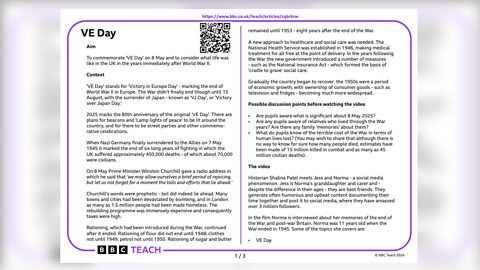
The sights and sounds of VE Day from the BBC archive
Related links
VE Day - Teaching Resources
To commemorate VE Day we've put together a collection of primary and secondary teaching resources for use in the classroom.
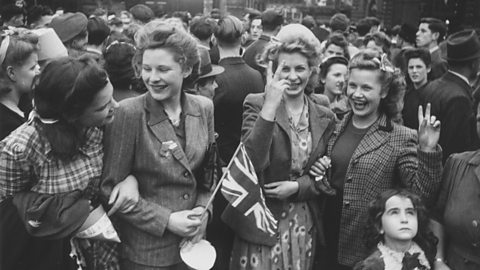
Bitesize: KS3 History
World War Two: An overview
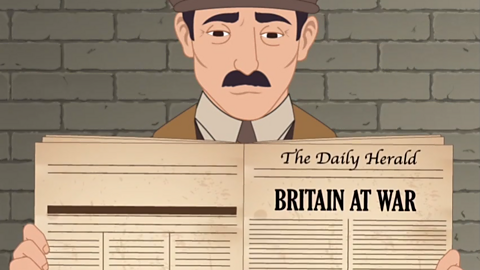
History of the BBC - VE Day broadcasts. videoHistory of the BBC - VE Day broadcasts
Winston Churchill announces the end of the War in Europe with a speech broadcast from Downing Street on 8 May 1945.
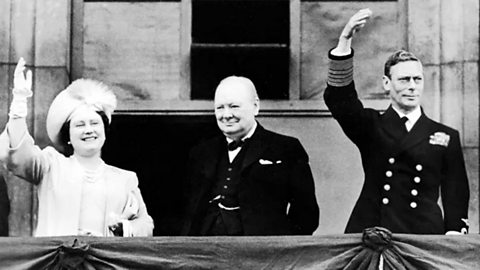
BBC News: 'My nan is TikTok famous'
Secondary assemblies
Holocaust Memorial Day – secondary assembly. collectionHolocaust Memorial Day – secondary assembly
An assembly framework and video to help mark Holocaust Memorial Day. In this video, Emma-Louise Amanshia meets John Hajdu MBE to hear about his experiences of surviving the holocaust.
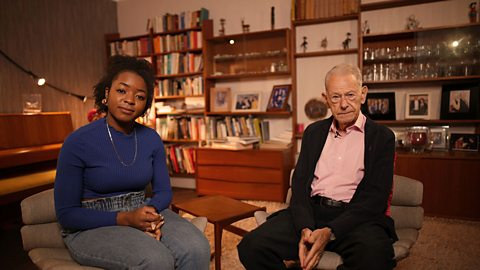
1971 Women's World Cup: The Lost Lionesses – secondary assembly resources. collection1971 Women's World Cup: The Lost Lionesses – secondary assembly resources
An assembly framework and video to celebrate a major sporting occasion and the achievements of the England women's football team who competed in the 1971 Women's World Cup in Mexico.
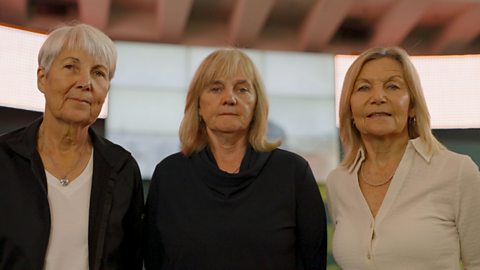
Jane Austen at 250 - secondary assembly. collectionJane Austen at 250 - secondary assembly
An assembly framework to mark the 250th anniversary of the birth of Jane Austen in 2025 and to celebrate her contribution to storytelling and consider celebrity.
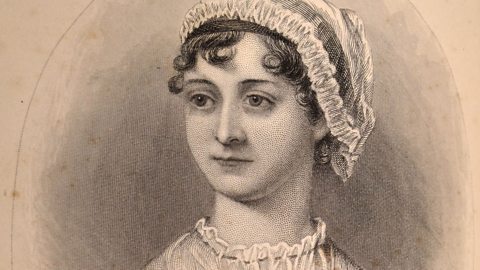
Anti-Bullying Week – secondary assembly. collectionAnti-Bullying Week – secondary assembly
A secondary assembly framework and video to mark Anti-Bullying Week focusing on the power of words and the need to use them carefully.
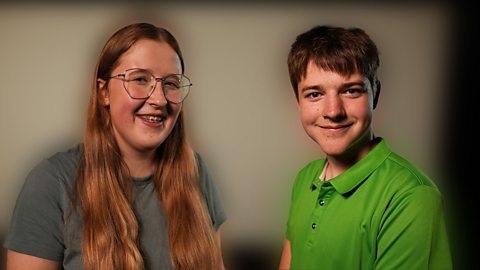
Safer Internet Day - secondary assembly. collectionSafer Internet Day - secondary assembly
An assembly framework and video to mark Safer Internet Day, celebrate online safety and to consider practical steps to remaining safe online.

D-Day – secondary assembly. collectionD-Day – secondary assembly
Two videos about the D-Day landings from both a British and German perspective to provide an understanding of the actions of the human beings involved on both sides.
